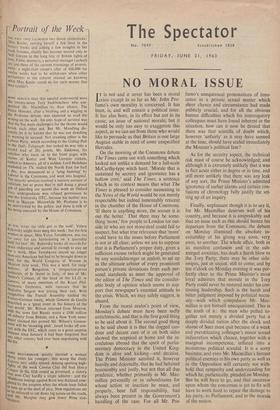NO MORAL ISSUE
T is not and it never has been a moral 'crisis except in so far as Mr. John Pro fumo's own morality is concerned. It has been, is, and will remain a political issue. It has also been, in its effect but not in its cause, an issue of national morale; but it would be only too easy to exaggerate this aspect, as we can see from those who would like to persuade us that Britain is one large Augean stable in need of some unspecified Hercules.
On the morning of the Commons debate The Times came out with something which looked not unlike a demand fora full-scale McCarthy-type witch hunt. 'Morale that is sustained by secrecy and ignorance has a hollow core,' said The Times, a sentence which in its context means that what The Times is pleased to consider nauseating in the News of the World would be not merely respectable but indeed lamentably reticent in the chamber of the House of Commons. `If there is anythinob more, the sooner it is out the better.' That there may be some- thing 'more,' few people in London (or out- side it) who are not stone-deaf could fail to suspect, but what true relevance that 'more' could have to the issues before Parliament is not at all clear; unless we are to suppose that it is Parliament's proper duty, given a sufficient excuse (which might be generated by any scandalmonger or zealot), to set up as the ultimate arbiter of every prominent person's private deviations from such per- sonal standards as meet the approval of the editor of The Times and the consider- able body of opinion which seems to sup- port that newspaper's essential attitude to the crisis. Which, we may safely suggest, is absurd.
From the moral zealot's point of view, Monday's debate must have been sadly anticlimactic, and that is the first good thing to be said about it. The second good thing to be said about it is that the dogged can- dour and decent care of it on both sides showed the sceptical at home and the in- credulous abroad that the spirit of parlia- mentary democracy in the United King- dom is alive and kicking—and decisive. The Prime Minister satisfied it, however heavily and dejectedly, that he had behaved honourably and justly, but not that all due prudence, whether primarily in Mr. Mac- millan personally or in subordinates for whose action or inaction he must, and properly, bear full responsibility, had always been present in the Government's handling of the case. For all Mr. Pro- fumo's unequivocal protestations of inno- cence in a private sexual matter which sheer chance and circumstance had made publicly crucial, and for all the obvious human difficulties which his interrogatory colleagues must have found inherent in the situation, how can it now be denied that there was that scintilla, of doubt which, however 'unfairly' as it may have seemed at the time, should have sealed immediately the Minister's political fate?
As for the security aspect, the technical risk must of course be acknowledged; and although it is extremely unlikely that it was in fact acute either in degree or in time, and still more unlikely that there was any leak of any sort, the Prime Minister's admitted ignorance of earlier alarms and certain con- fusions of chronology fully justify the set- ting up of an inquiry.
Finally, unpleasant though it is to say it, for Mr. Macmillan deserves well of his country, and because it is unspeakably sad that an issue such as this should hasten his departure from the Commons, the debate on Monday illumined the absolute in- evitability of his giving way soon, very, soon, to another. The whole affair, both in its manifest confusion and in the sub- merged anxieties, has dealt a harsh blow to the Tory Party; there may be other side- swipes, just or unjust, still to come; and by ten o'clock on Monday evening it was per- fectly clear to the Prime Minister's most loyal admirers that morale in the Tory Party could never be restored under his con- tinuing leadership. Such is the harsh and bitter judgment imposed by political neces- sity—with which compulsion Mr. Mac- millan is not himself unacquainted. This is the truth of it : the man who pulled to- gether not merely a divided party but a deeply divided nation after the shock and shame of Suez must quit because of a weak and prevaricating colleague's minor sexual indiscretion which chance, together with a marginal incompetence, inflated into a monstrous political scandal. It is a sorry business, and even Mr. Macmillan's fiercest political enemies in his own party as well as in the Opposition will certainly not with- hold that sympathy and understanding for which he, pathetically, pleaded on Monday. But he will have to go, and that successor upon whom the concensus is yet to fix will have to work hard to repair the damage to his party, to Parliament, and to the morale of the nation.


































 Previous page
Previous page